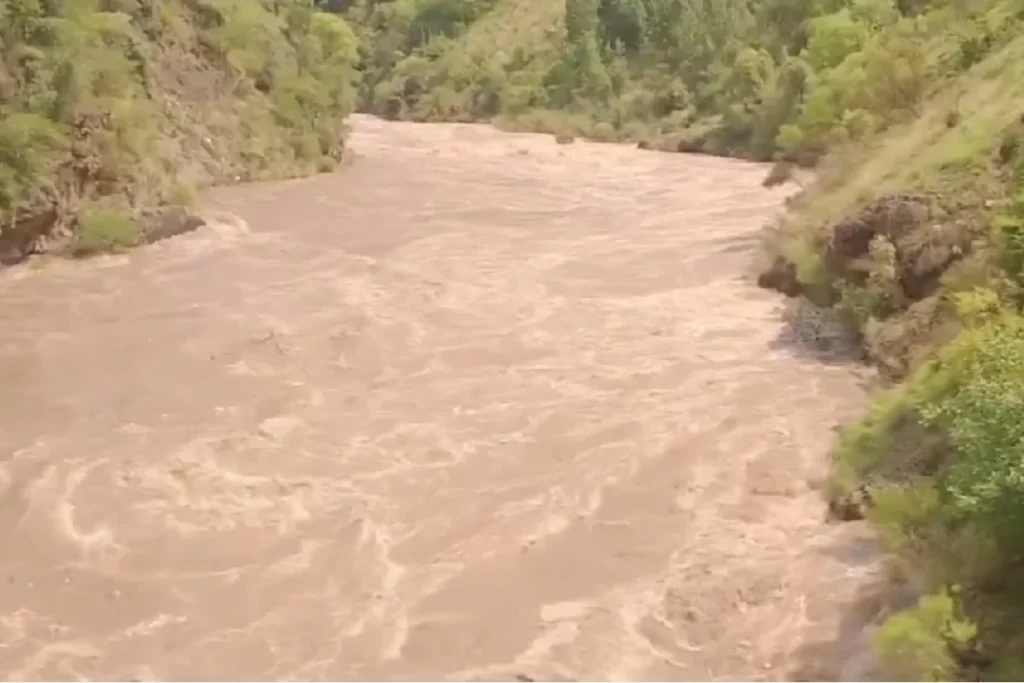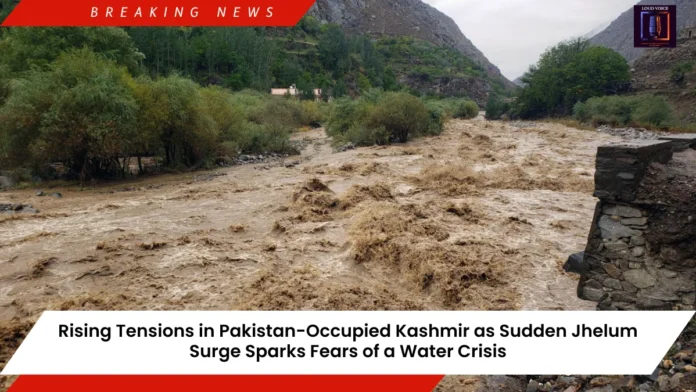Key Takeaways
- Rising Tensions in Pakistan-Occupied Kashmir have been fueled by a sudden surge in the Jhelum River, raising accusations against India over water release tactics.
- Muzaffarabad and surrounding villages faced emergency evacuations amid fears of flooding.
- The Indus Waters Treaty suspension by India exacerbates long-standing geopolitical tension.
- Social media captured scenes of widespread panic as the river burst its banks.
- Experts caution that these developments could destabilize regional peace further.
An Unexpected Surge: Jhelum River’s Fury Shakes Pakistan-Occupied Kashmir
The afternoon skies over Muzaffarabad darkened not with clouds, but with fear. Without warning, the Jhelum River, lifeblood of Pakistan-occupied Kashmir (PoK), began rising at an alarming pace, sending waves — both literal and political — rippling across the region.
Emergency sirens pierced the mountain air as mosque loudspeakers urged residents from Chakothi to Hattian Bala to flee immediately. Within minutes, streets flooded with panicked families, clutching belongings, searching for higher ground.
“It felt like we had no time to think,” said a resident of Ghari Dupatta. “One moment everything was normal, and the next, the river was roaring toward us.”
This wasn’t just a natural disaster warning. Beneath the surface ran accusations of a far graver strategy at play.
Water as a Weapon? Accusations Fly Across the Border
In the wake of a devastating terrorist attack in Pahalgam, India took unprecedented steps by announcing the suspension of the Indus Waters Treaty (IWT) — a cornerstone of Indo-Pak peace since 1960. Days later, the sudden deluge from India’s Anantnag district seemed, to many in PoK, not a coincidence but a calculated move.
“Today’s water release is no accident,” said political commentator Javed Siddique. “It’s a clear signal that the rules have changed.”
On social media, hashtags like #WaterTerrorism and #JhelumFloods trended, as videos showed the Jhelum in full fury, demolishing fields, bridges, and the fragile sense of normalcy.
Pakistani officials quickly proclaimed a “water emergency” in several strategic areas, but charges against India are still growing, raising concerns about intentional “hydrological warfare.”
A Treaty Under Siege: The Fragile Legacy of Indus Waters
For over six decades, even through bitter wars, the Indus Waters Treaty held firm, acting as a silent guardian against escalation. Its premise was simple yet profound: water would flow freely, immune to the chaos of politics. That era, it seems, is now under threat.
India’s decision to suspend the IWT followed the brutal Pahalgam attack where Islamic terrorists targeted and killed 27 Hindu tourists. In response, the Indian government not only suspended water-sharing but also tightened visa norms, closed the Attari-Wagah border, and ordered Pakistani nationals to leave Indian territory.
Prime Minister Narendra Modi’s firm stance, following a critical Cabinet Committee on Security (CCS) meeting, underscores a new doctrine — one where water, long a bridge between two nations, may now be weaponized.
Life Along the River: Real Stories from the Crisis Zone

As the Jhelum raged, so did personal tragedies. In Majhoi village, farmers helplessly watched as crops, months from harvest, were swallowed in minutes. Local clinics overflowed with displaced families needing food, shelter, and urgent medical care.
“We have lived by this river for generations,” said Abdul Hafeez, a local elder. “But never have we feared it like today.”
The psychological toll is palpable. In a region already bruised by years of political instability, the sudden violence of nature — or, as some claim, a man-made calamity — has deepened scars.
Regional Reverberations: A Brewing Diplomatic Crisis
Far beyond the riverbanks, political capitals are abuzz.
Pakistani Prime Minister Shehbaz Sharif called for a “neutral and transparent investigation” into both the Pahalgam terror attack and the water release incident. In the meantime, Saudi Arabia and Iran have discreetly volunteered to mediate because they are concerned about the growing hostilities between the two nuclear-armed neighbors.
Yet, mediation may not come easy. The images flooding out of PoK have already inflamed public opinion, hardening positions on both sides.
Experts warn that if accusations of deliberate flooding hold water — pun intended — the very foundations of regional stability could be washed away.
“This is not just about water or land,” said international relations scholar Dr. Ayesha Khan. “This is about trust, and once broken, it’s very difficult to rebuild.”
The Bigger Picture: Climate, Conflict, and Control
Environmental experts identify a darker undertone despite politics taking center stage in the news. As climate change accelerates glacial melts and unpredictable monsoon patterns, South Asia’s water disputes are only expected to worsen.
Coupled with political animosities, rivers like the Jhelum could become flashpoints for future conflicts, with millions downstream at risk. The present crisis, they argue, should be a wake-up call — not just for India and Pakistan, but for the world.
Conclusion
As the Jhelum’s waters surged without warning, so too did decades-old fears of a catastrophic clash between two volatile neighbors. Whether this was a calculated warning shot or a tragic accident remains under investigation. But one truth stands clear: in South Asia, water is no longer just a resource — it is power, politics, and potentially, peril.
Only time will tell whether the rising waters will wash away old animosities — or deepen them forever.


